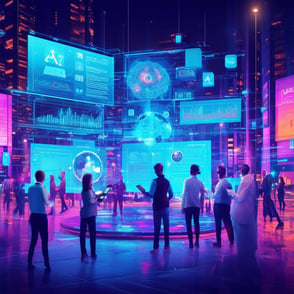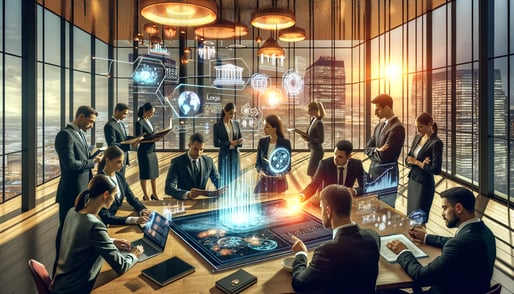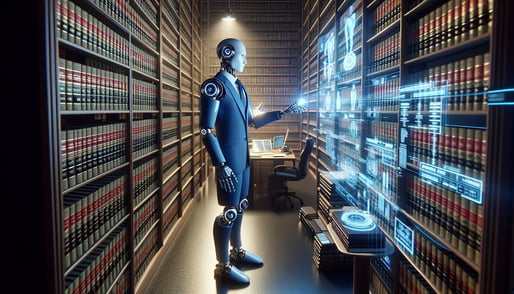Unveiling AI in Law: How Lawyers Can Use ChatGPT Prompt for Legal Insights
The legal profession is at a crossroads, with artificial intelligence like ChatGPT becoming an invaluable ally. Imagine, if you will, a world where lawyers can leverage AI to sift through vast amounts of legal documents with unprecedented speed and accuracy. That world is now!
How Can Lawyers Utilize ChatGPT in Legal Analysis?
Picture this: a lawyer, coffee in hand, queries ChatGPT chatbot about a complex legal issue. Within seconds, they receive a detailed analysis, complete with citations and relevant case law. This isn't science fiction; it's the reality of legal research today, where ChatGPT aids in dissecting legal language and providing actionable insights. The integration of ChatGPT into legal teams transforms how they approach everything from drafting contracts to preparing for court.
Integrating ChatGPT with Legal Research to Transform Law Practice
Now, let's dive deeper. Imagine our lawyer using Chat GPT chat bot to prepare for a case, asking it to analyze legal precedents or interpret a client’s legal standing. The tool responds with precise legal arguments and pertinent citations, all while referencing the most recent and relevant case law. This isn't just about speed; it's about enhancing the quality and depth of legal analysis, ensuring that no stone is left unturned.
What Are the Implications of AI for the Law Industry?
As lawyers embrace AI tools like ChatGPT, we witness in 2023 a paradigm shift in legal practice. AI doesn't just make tasks faster; it redefines what's possible, pushing the boundaries of legal innovation and enabling a more informed, agile approach to legal challenges.
OpenAI's Contributions to Legal Innovations and Lawyer's Adaptability
Consider the broader picture: OpenAI's advancements have not only given rise to tools like ChatGPT but also signaled a new era in legal technology. Lawyers now navigate a landscape where AI's insights drive strategies, influencing everything from case outcomes to firm policies. In this new world, staying updated with AI advancements isn't optional; it's imperative for legal success.
Mastering Legal Drafting: Utilizing AI to Enhance Legal Briefs and Navigate Case Law
Legal drafting is an art, one that requires precision, clarity, and a deep understanding of the law. With AI's entry into the legal sphere, this art is being redefined, offering lawyers a powerful tool to enhance their legal documents.
How Does AI Revolutionize Legal Drafting and Documentation?
Imagine an AI tool that not only suggests improvements to your legal briefs but also ensures they align with the latest legal standards. This is no longer a figment of imagination but a reality where AI, like ChatGPT, assists lawyers in crafting documents that are not just thorough but also compliant and persuasive.
The Synergy Between AI and Lawyers in Producing Comprehensive Legal Briefs
This synergy between AI and human intelligence is transformative. Lawyers can now draft with an AI assistant that provides real-time advice, suggestions, and even legal citations. This partnership is not about replacing the lawyer but enhancing their capabilities, ensuring they produce the best possible work.
In What Ways Can AI Assist in Case Law Analysis?
Legal professionals are well aware of the importance of precedent in legal argumentation. AI tools are now capable of analyzing and presenting relevant case law, offering insights that might take days to uncover manually.
Leveraging AI to Uncover Precedents and Interpretations in Case Law
Through AI, lawyers gain access to a robust database of case law, with the ability to quickly identify relevant precedents. This not only saves time but also provides a more comprehensive understanding of the legal landscape, empowering lawyers to make more informed arguments and decisions.
Safeguarding Legal Integrity: AI's Role in Preventing Sanctions and Identifying Fake Cases
The legal industry is built on trust and integrity. With the advent of AI, new tools are available to uphold these values, detecting potential issues before they escalate.
How Can AI Prevent Legal Sanctions and Ensure Compliance?
Envision AI as a watchdog for legal compliance, proactively identifying areas of concern and helping law firms avoid potential sanctions. This technology is not about diminishing the lawyer's role but about providing a safety net, ensuring that their work meets all legal and ethical standards.
AI's Predictive Capabilities in Identifying Risk Factors for Sanctions
With AI, firms can predict and mitigate risks, ensuring they remain on the right side of the law. This predictive capability is invaluable, allowing lawyers to take preemptive actions to safeguard their clients and themselves.
Can ChatGPT Prompt on OpenAI Identify and Mitigate Fake Legal Cases?
In a world where the authenticity of information can be questionable, AI stands as a bastion against deception, identifying fake cases and ensuring the integrity of legal processes.
Utilizing AI to Analyze Patterns and Flag Potential Fake Cases
AI's ability to scrutinize data and identify irregularities can be a game-changer in detecting fraudulent legal activities. By analyzing patterns and inconsistencies, AI tools like ChatGPT provide an additional layer of defense against the fabrication of legal cases, protecting the profession's integrity and trustworthiness.
Conclusion
The integration of AI, and specifically ChatGPT, into the legal realm is transforming how legal professionals approach their work, offering tools for enhanced accuracy, efficiency, and insight. As we move further into 2024, the role of AI in law will undoubtedly continue to grow, becoming an indispensable asset for legal professionals worldwide.
FAQs
- How does ChatGPT serve as an artificial intelligence chatbot for lawyers in handling cases like Avianca's? ChatGPT assists lawyers by providing detailed analyses and insights on cases, similar to how it might analyze the complexities involved in "granted Avianca's motion to dismiss." It uses generative AI to synthesize vast amounts of data and legal precedents, offering support in crafting compelling arguments and understanding judicial decisions, like those made by District Judge Kevin Castel or in contexts involving the Southern District of New York.
- In what ways has ChatGPT been utilized in notable legal scenarios, such as those involving lawyers Steven Schwartz and Peter LoDuca? In scenarios echoing the challenges faced by lawyers Steven Schwartz and Peter LoDuca, ChatGPT can be used to scrutinize the validity of cases, distinguishing between genuine and fictitious claims. By analyzing legal documents and case histories, ChatGPT provides insights that help in identifying the "phony cases" or supporting motions to dismiss based on fabricated legal grounds, as seen in high-profile district court cases.
- How does ChatGPT address the challenges posed by 'bad faith' litigations and ensure compliance with ethical standards in law firms? ChatGPT, when deployed within law firms, can serve as a tool for identifying potential 'bad faith' litigations or unethical practices, such as those that might involve 'bogus legal' claims. By reviewing historical data and comparing it with ongoing cases, ChatGPT helps in recognizing patterns indicative of deceit or unethical behavior, thereby aiding firms in maintaining their integrity and adhering to strict legal and ethical standards.
- Can ChatGPT, powered by generative AI, help law firms like those involved with Avianca to manage complex legal filings and maintain up-to-date legal documentation? Yes, ChatGPT can significantly aid law firms dealing with intricate legal filings, similar to the Colombian airline Avianca's legal battles, by streamlining the preparation and management of legal documents. Whether it's drafting motions, analyzing case law, or ensuring timely filings, ChatGPT's AI-powered capabilities enhance efficiency and accuracy, particularly in managing the voluminous documentation associated with large or intricate cases.
- What role does ChatGPT play in shaping the future of law, especially concerning AI legal frameworks and the use of AI-powered legal software? ChatGPT is at the forefront of shaping the 'future of law,' especially in developing AI legal frameworks and enhancing legal software. As legal professionals increasingly 'ask ChatGPT' for assistance, its responses, informed by current laws and case precedents, not only provide immediate aid but also contribute to a broader understanding of how AI can be ethically and effectively integrated into legal practices, paving the way for a future where AI-powered tools are standard in the legal industry.
- How should a law firm's robot or AI chatbot navigate legal intricacies when faced with a motion to dismiss a case, similar to what Schwartz said in the context of the Avianca situation? When dealing with motions to dismiss, similar to the scenario faced in the Avianca case, a law firm's AI chatbot should analyze past rulings, like those made by Judge Castel, and generate responses that align with legal precedents. The AI tool must scrutinize every detail to ensure the firm's stance is robust, especially when the opposing party, like Schwartz, asserts strong positions.
- What role does AI play in ensuring that lawyers adhere to ethical standards, especially when allegations of bad faith or fictitious claims arise, as seen with two lawyers in a high-profile case? AI can serve as an ethical checkpoint for lawyers, flagging potential issues of bad faith or fictitious claims by cross-referencing with known legal standards and past case outcomes. In scenarios where lawyers, akin to the situation involving Schwartz and Levidow, face ethical dilemmas, AI-generated insights can guide them towards upholding integrity, much like a federal judge, such as Judge Castel, would expect in their courtroom.
- How can law firms leverage AI, particularly in drafting legal documents, to prevent situations where a case could be dismissed due to filing inaccuracies or lateness, as observed in the Colombian airline Avianca case? To prevent dismissals due to procedural errors, law firms can use AI to track deadlines and verify document accuracy, ensuring filings are both timely and compliant with legal standards. AI's capability to generate and check citations, as would be scrutinized by a US district judge, can be pivotal in avoiding the pitfalls that led to Avianca's motion-related challenges.
- In light of AI's growing use in legal settings, how should lawyers respond if AI, such as a chatbot, is accused of generating inauthentic or 'invented by the artificial' legal arguments? Lawyers must critically evaluate any AI-generated content for authenticity, especially if it faces scrutiny similar to that experienced by district judge Kevin Castel's court. If an AI tool, under a law firm's use, is challenged for authenticity, lawyers should verify the information against reliable sources, ensuring any AI-generated argument or citation stands up to judicial examination and adheres to the firm's company policy on AI use.
- When AI assists in legal analysis, how can lawyers ensure that the advice provided, particularly in complex cases like those overseen by judges in the Southern District of New York, remains accurate and free from inaccuracy? Lawyers must rigorously review AI-provided legal analysis, particularly when dealing with complex cases that might appear before notable districts like the Southern District of New York. They should cross-check AI advice against established legal doctrine and precedent, ensuring its validity and relevance. In cases of uncertainty, consulting with seasoned legal professionals or seeking a second opinion can further safeguard against reliance on potentially inaccurate AI-generated advice.
Tags:
AIMar 2, 2024 6:47:28 PM






Comments